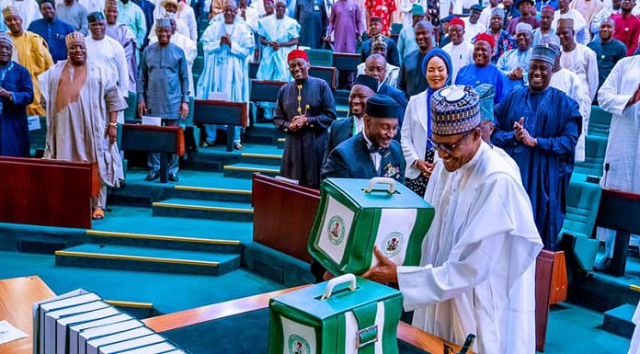- Sets aside N1.6bn for national grazing reserve devt
- Allays fears on TIN enforcement
The federal government Thursday signified its intention to start the implementation of the 2020 Budget, which President Muhammadu Buhari signed into law on Tuesday, from January 1.
With the decision, the 2019 Budget, which was signed into law on May 27 of the same year, would not run its full course.
It also forecloses further capital releases in the 2019 capital vote, of which Minister of Finance, Budget and National Planning, Mrs. Zainab Ahmed, told State House reporters on Wednesday that N1.2 trillion had been released as at last week.
Ahmed, while giving a breakdown of the 2020 Budget yesterday in Abuja, said to drive a seamless and effective budget delivery, the government, this time, would also issue guidelines for the implementation of the budget in order to ensure timely capital releases.
She also allayed fears over the reports that bank customers without Tax Identification Numbers (TIN) will not be allowed to operate accounts from January 2, 2020, saying that the enforcement would be a gradual process after wide consultations with various stakeholders, including banks.
Ahmed said with the timely preparation and passage of the budget, which would restore the normal budgetary cycle, implementation would commence on January 1.
According to her, the N10.594 trillion budget with N4.493 trillion recurrent and N2.465 trillion for capital expenditure has a revenue projection of N8.42 trillion.
Of the amount from the revenue projection, N2.64 trillion is from oil revenue, N1.81 trillion from non-oil and N3.97 trillion from other sources.
Ahmed noted that the projected N8.42 trillion revenue for 2020 is 3.2 per cent or N263.94 billion higher than the proposal sent by the executive, and 10.9 per cent more than the 2019 Budget of N7.59 trillion .
A further breakdown of the budget indicates that for recurrent, the Ministry of Defence received the lion’s share of N784.59 billion; Ministry of Education, N501.48 billion; Police Affairs–N394,57 billion; Health-N359.33 billion; Interior-N219.46 billion; Youth and Sports-N168.33 billion; Office of the National Security Adviser-N116.91 billion; Petroleum Resources-N75.96 billion; Foreign Affairs-N67.81 billion; Office of the Secretary to the Secretary to the Government of the Federation- N59.60 billion; Agriculture and Rural Development-N58.69 billion and Presidency, N46,56 billion.
For capital expenditure, Ministry of Works and Housing topped the chart with N315.56 billion followed by Education-N185.34 billion; Agriculture- and Rural Development-N124.40 billion and Transportation–N121.37 billion, among others.
The budget also has N560 billion provisioned for Statutory Transfer, N2.453 trillion for debt service and N273 billion sinking fund to retire maturing bonds to local contractors.
Line items under Statutory Transfer include N128 billion for the National Assembly, N111.79 billion for the Universal Basic Education, N111.79 billion for National Judicial Council (NJC), N80.88 billion for the Niger Delta Development Commission (NDDC), and N40 billion for the Independent National Electoral Commission (INEC).
Others are N47.7 billion for the Public Complaints Commission, N38.1 billion for the North East Development Commission (NEDC) and N44.5 billion for Basic Health Care Provision Fund.
To promote fiscal transparency, accountability and comprehensiveness, the minister stressed that the budget of 10 major government-owned enterprises (GOEs) had been integrated in the Federal Government of Nigeria (FGN) budget with effect from 2020.
According to the minister, in aggregate, 44 per cent of projected revenues is to come from oil-related sources while 56 per cent is to be earned from non-oil sources, adding that overall, the size of the budget has been constrained by relatively low revenues.
The fiscal plan, which also has a deficit of N2.175 trillion, will be financed from new domestic borrowings of N744.99 billion and N850 billion foreign borrowings with privatisation proceeds expected to account for N252 billion.
On some of the projects listed for the fiscal year, the minister said N210 billion was being provisioned for some road projects across the six-geopolitical zones.
Some of the roads include the construction and rehabilitation of Makurdi-Enugu road, counterpart funding for the dualisation of Akwanga–Jos-Bauchi-Gombe road, reconstruction of the outstanding sections of Benin-Ofosu-Ore-Ajebandele-Sagamu Expressway, and construction of Bodo-Bonny road, among others.
According to the minister, the Ministry of Agriculture and Rural Development has over N9 billion provisioned for the promotion and development of value chains in more than 30 different commodities.
These include N1.6 billion for National Grazing Reserve Development, N3 billion for veterinary and pest control services, N7.64 billion for rural roads and water sanitation, and N1.02 billion FGN support for women and youth in agribusiness, among others.
On reports that bank customers without TIN will not be allowed to operate accounts from January 2, 2020, the minister said enforcement would be a gradual process after wide consultations by various stakeholders, including banks.
The minister added that series of engagements between the Federal Inland Revenue Service (FIRS) and commercial banks, among others, will precede the implementation of TIN.
She noted that although the target is to begin to the implementation of the Finance Bill by January if signed into law by Buhari, not all the provisions of the bill would take effect from January as suggested in some quarters.
Ahmed said reforms such as the Strategic Revenue Growth Initiative (SRGI) would be implemented with increased vigour to improve revenue collection and expenditure management.
Source: THISDAY












